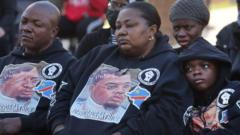As tensions and protests escalate, thousands of Israeli reservists from various military branches have publicly called for Prime Minister Benjamin Netanyahu's government to end the ongoing conflict in Gaza. Instead of persisting with military efforts, many are urging a renewed focus on negotiating the return of the 59 hostages held by Hamas. The shift in sentiment is stark compared to the initial support for the war's objectives following Hamas’s attack on October 7, 2023.
Israeli Reservists Demand End to Gaza Conflict as Pressure Mounts on Netanyahu

Israeli Reservists Demand End to Gaza Conflict as Pressure Mounts on Netanyahu
Growing dissent among Israeli reservists over the Gaza war raises questions about the government's priorities amid hostage crisis.
Since Israel's re-entry into combat after a ceasefire ended in March, disillusionment has grown, with former Mossad chief Danny Yatom articulating concerns that Netanyahu's actions reflect self-interest rather than national duty. This criticism has led reservists to sign open letters demanding an end to the fighting. The first of these letters emerged in April, gathering support from 1,000 air force members, warning that continuing the war jeopardizes the hostages' lives. This message has resonated widely, amassing over 12,000 signatures from all military branches.
As the political landscape shifts, some reservists are refusing deployments, with reports indicating reserve attendance has dwindled significantly. The decision has sparked fears of a crisis reminiscent of the ramifications seen in previous conflicts. One reservist, identified only as “Yoav,” expressed a profound moral dilemma, stating that continued military efforts in Gaza threaten to compromise Israel's foundational values and ethics.
Retired military leaders echo these sentiments, calling for disobedience to prevent potential war crimes. While Netanyahu dismisses the protests as unfounded, public opinion appears to sway towards supporting a new ceasefire focused on hostage recovery. Activists are drawing attention to the consequences of war on both sides, with protests in Tel Aviv juxtaposing images of hostages against the backdrop of Palestinian suffering.
In a climate of escalating rhetoric, the government faces mounting pressure to reconsider its military strategies as Israeli society grapples with the moral implications of the ongoing conflict.
As the political landscape shifts, some reservists are refusing deployments, with reports indicating reserve attendance has dwindled significantly. The decision has sparked fears of a crisis reminiscent of the ramifications seen in previous conflicts. One reservist, identified only as “Yoav,” expressed a profound moral dilemma, stating that continued military efforts in Gaza threaten to compromise Israel's foundational values and ethics.
Retired military leaders echo these sentiments, calling for disobedience to prevent potential war crimes. While Netanyahu dismisses the protests as unfounded, public opinion appears to sway towards supporting a new ceasefire focused on hostage recovery. Activists are drawing attention to the consequences of war on both sides, with protests in Tel Aviv juxtaposing images of hostages against the backdrop of Palestinian suffering.
In a climate of escalating rhetoric, the government faces mounting pressure to reconsider its military strategies as Israeli society grapples with the moral implications of the ongoing conflict.




















